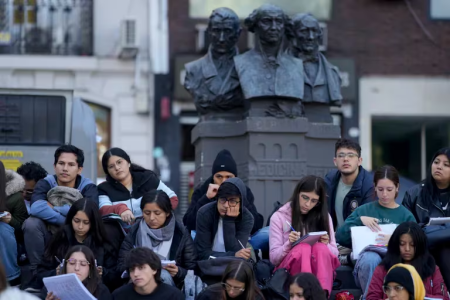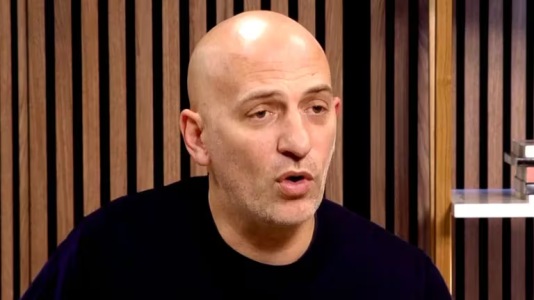All the Answers
Well-known member
Javier Milei confronts the university system: how it currently works and which are the few countries in which degrees are free - Infobae

Source:

Javier Milei se enfrenta al sistema universitario: cómo funciona actualmente y cuáles son los pocos países en los que las carreras son gratuitas
El Presidente reclamó que se muestren los gastos de los establecimientos educativos y denunció un presunto adoctrinamiento en las aulas, mientras un grupo de directivos, docentes y alumnos marchará en contra de un supuesto desfinanciamiento del sector
April 22, 2024
The President demanded that the expenses of educational establishments be shown and denounced alleged indoctrination in classrooms, while a group of directors, teachers and students will march against an alleged defunding of the sector
By Federico Galligani

Students from the University of Buenos Aires (UBA) take class on the street (AP Photo/Natacha Pisarenko)
Currently, according to official data, in Argentina there are a total of 62 universities and five public university institutes that are autonomous and provide services in different regions of the country through different careers that can be accessed for free.
In accordance with Law No. 24,521 on Higher Education, the national, provincial or city State of Buenos Aires, as appropriate, are responsible for “providing financing, supervision and oversight of the universities” that operate under their orbits, They also have the obligation to control privately managed establishments.
Even, article 2 bis of this regulation established that “degree studies in state-run higher education institutions are free and imply the prohibition of establishing any type of direct or indirect levy, fee, tax, tariff, or fee on them. indirect”.
Within the framework of the adjustment policy of the Javier Milei government , in recent times the ruling party has focused on the quality of the system and the resources that are allocated to maintaining these training centers, which are in charge of their own audits.
Since November 28, 2022, based on an Opinion of the Treasury Attorney, headed at that time by Carlos Zannini and based on file IF-2022-128362119-APN-PTN, it was determined that the controls of the General Audit Office of the Nation (SIGEN) “are not applicable to national universities.”
In this way, it was highlighted that the internal audit function is exclusive to each institution that, in some cases, reports to the Auditor General of the Nation (AGN), an autonomous body that assists Congress in reviewing the actions of the Government and which is usually in the hands of the opposition.

An Opinion by Carlos Zannini modified the way in which national universities are audited (Gustavo Gavotti)
In this context, the National Interuniversity Council (CIN) demanded from the Ministry of Human Capital, led by Sandra Pettovello , an update of the funds that higher education institutions receive to meet their expenses.
Specifically, the directors of the country's public universities assure that, as the Government delivered the same budget amounts as in 2023, financing had been reduced in real terms, due to inflation.
After several protest measures by teachers and student centers, which included classes on public roads, as a way of exposing an alleged lack of resources, the sector called on social networks for a demonstration for next Tuesday .
According to sources close to Milei , the Government "is not concerned" about the possible repercussions of this mobilization and, in addition, it was warned that a special security protocol will be applied to guarantee the free movement of traffic during the day.
As published by this media, last week the presidential advisor Santiago Caputo contacted the vice-rector of the UBA, Emiliano Yacobitti , whom he has known for several years, to try to reach an agreement and deactivate the march, but the negotiations failed. They bore fruit.

The vice-rector of the UBA, Emiliano Yacobitti
The portfolio led by Pettovello reported that the allocations sent by the treasury increased by 70% in the month of March and there will be an equal increase in the month of May, which totals a recomposition of 140%, according to official data.
For his part, during a television interview, Yacobitti maintained that the proposal from the national authorities “does not resolve anything” and pointed out that, for example, the number of “teachers and residents was reduced by almost 36%.”
Milei himself echoed the conflict and, in addition to questioning the lack of control of the expenses of these establishments, denounced an alleged “indoctrination” of the students: “The cognitive dissonance generated by brainwashing in public education is tremendous.” ” he wrote on his X account.
Likewise, the President shared on this same social network some videos recorded by students of different levels, in which teachers and administrators are shown campaigning against La Libertad Avanza during the election period and debating politics in the classrooms.

Video compartido por Javier Milei
Uno de los videos que el Presidente compartió en sus redes sociales
cdn.jwplayer.com
One of the videos that the President shared on his social networks
According to the European Documentation Center of Almería (CDE), in the Old Continent only 15 countries offer free higher education (Scotland, Finland, Austria, Germany, Cyprus, Malta, Greece, Denmark, Iceland, Norway, Poland, Sweden, Slovenia, Slovakia and the Czech Republic), although in some cases the student must meet certain requirements.
“There are those who are in favor of free education, based on political arguments (education is a public good, not exclusive and favors equal opportunities); and against, because it generates inefficiencies and favors the most advantaged social strata, subtracting resources that would go to cover other needs of the less favored strata," explained Francesc Pedró, director of the UNESCO International Institute for Higher Education in Latin America. and the Caribbean (IESALC), by participating in the Forum “Seventy years of free university higher education. Tribute and teachings”, convened by the Argentine National Interuniversity Council (CIN).
The expert explained on that occasion that “there are few countries in Europe where students do not pay anything in fees” and “even in public institutions, there is a registration rate or fee that covers, in most cases, between 10 and 80% of the cost of a place.”
In fact, according to a study by IESALC, the abolition of gratuity has been more frequent in recent years than its promulgation, although in some places, such as Canada and Chile, progress was made with a mixed system, in which only the 100% of the enrollment of certain students.

